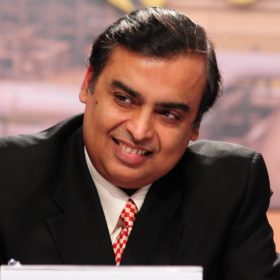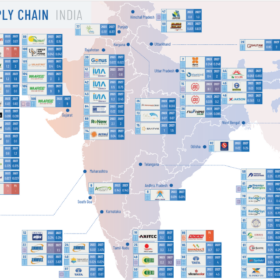Gogoro Inc. (Nasdaq: GGR), a global technology leader in battery-swapping ecosystems that enable sustainable mobility solutions for cities, today announced the immediate availability of its battery swapping ecosystem and Smartscooters in India. The company also unveiled its first India-made Smartscooter, the CrossOver GX250.
Initially available to B2B customers in Delhi and Goa, the company plans to roll out in Mumbai and Pune in the first half of 2024, with consumer availability in the second quarter of 2024.
“We are at the cusp of a dramatic change in the global urban transportation landscape, and with its more than 250 million mopeds and motorcycles India is well positioned to lead the shift to sustainable consumer and B2B transportation,” said Horace Luke, founder and CEO of Gogoro. “The Gogoro CrossOver series embodies everything our brand has come to stand for and the new made-in-India CrossOver GX250 is optimized for riders in India with more seating space, greater storage and better ground clearance.”
Gogoro CrossOver Series
The CrossOver series is built on a redesigned all-terrain frame that enables increased rigidity and comfort while offering a variety of storage, riding and customization capabilities. The CrossOver will be available in India in three models, the CrossOver GX250, CrossOver 50 and CrossOver S. The CrossOver GX250 is immediately available today with the CrossOver 50 and CrossOver S shipping later in 2024.
CrossOver GX250
Manufactured in Maharashtra India, the CrossOver GX250 is Gogoro’s first India-made Smartscooter. The CrossOver GX250 captures the best of Gogoro’s new CrossOver Smartscooters while integrating India-specific features that Gogoro pilot riders in India requested.
New All-Terrain Chassis
Optimized for various road conditions, the CrossOver GX250 adopts a newly developed all-terrain frame that provides increased rigidity for improved strength and stability. The new frame also provides 176mm of ground clearance, the highest in Gogoro’s current vehicle lineup.
Performance and Easy Control
CrossOver GX250 utilizes a 2.5 kW Direct Drive that provides a top speed of 60+kph and a certified range of 111km. The CrossOver GX250’s new frame design greatly increases the durability of the suspension system and accommodates larger loads while emphasizing comfort and stability.
Flexible Cargo Capacity
Designed to adapt to various riding scenarios, the CrossOver GX250 provides passenger riding space as well as ample storage options with a new mounting point expansion system that includes 26 locking points. With the ability to leverage four cargo areas including a platform design headlight, foot, seat and rear cargo space, the CrossOver GX250 can easily accommodate most storage needs. To carry more, the rear seat can be flipped up or removed to add cargo storage as needed.
In August, India’s International Centre for Automotive Technology (ICAT) certified the CrossOver GX250 for India. In November, Gogoro became the first foreign two-wheel OEM to be recognized by the Small Industries Development Bank of India (SIDBI) that entitled the CrossOver GX250 for its EV financing programs.
“Gogoro was uniquely created to introduce a mass market shift to sustainable energy in densely populated cities by establishing an intelligent battery swapping ecosystem for vehicle refueling that is safe, scalable and open. There has been significant demand in India for Gogoro battery swapping, Smartscooters and technologies and we are excited to be launching commercially with a variety of partners,” said Luke. “On average, last mile delivery riders ride more than six-times the distance as consumer riders, so enabling these delivery riders to adopt smart sustainable electric transportation can have an accelerated impact on a city.”
Commercial Partnerships
As more and more businesses in India embrace the need for sustainable transportation they require new mobility solutions for logistics, delivery fleets and taxi services that not only achieve the best alternative to gas-powered vehicles but are well suited to the specific market and industry needs in India. Gogoro offers swap & go battery swapping in seconds that is safe, reliable, and always available, while tethered electric charging still requires dedicated parking and charge time that reduces rider availability and income. Gogoro is working with a variety of partners in the region across three core business categories.
Businesses and Fleet Operators – Gogoro continues to work with large and small partners to enable sustainable delivery companies such as Zypp and logistics fleets and taxi services using Gogoro battery swapping and Smartscooters, including transitioning from traditional ICE vehicles.
Mobility-as-a-Service (MaaS) – Gogoro is working with partners like FutureEV to enable new sustainable business opportunities including the use of Gogoro’s GoShare platform that enables fractional and shared mobility-as-a-service deployments.
Turnkey Solution – Gogogo works with business partners to deploy a complete battery swapping ecosystem and Smartscooters that are made in India to new domestic and international markets like Nebula Energy in Nepal.
About Zypp Electric – Zypp Electric and Gogoro are continuing their long term partnership that began with a successful B2B partnership and is continuing with Gogoro’s integration into Zypp Electric’s fleet program.
About FutureEV – FutureEV is launching a scooter sharing service in the Indian tourist city of Goa exclusively using Gogoro battery swapping and Smartscooters. The company will begin a pilot on Dec 25, 2023, with a commercial launch expected in the first quarter of 2024. Goa is ranked 15th in the world in vehicle density and with more than 8.5 million tourists annually it will be mandatory that all new tourist vehicles, rent-a-cab and rent-a-bike, be electric from January 2024.
About Nebula Energy, a subsidiary of MG Group (Nepal) – Gogoro is also partnering with Nebula Energy to roll out battery swapping and Smartscooters in Nepal. Nebula Energy is a wholly owned subsidiary of MG Group, a new energy venture committed to leading the way towards an environmentally sustainable and energy independent Nepal.
Gogoro Battery Swapping
At the heart of Gogoro’s ecosystem is an open and interoperable battery swapping platform that was recognized earlier this year by Guidehouse Insights as the leading battery swapping company for lightweight urban vehicles in the world. Gogoro battery swapping is a new generation of swappable battery refueling that is smart, safe, and continually optimizing itself to be dynamic and versatile for riders, businesses, and communities. In July, India’s International Centre for Automotive Technology (ICAT) certified Gogoro’s Smart Battery for India. In Taiwan, the Gogoro Network supports nearly 600,000 riders and has more than 1.3 million smart batteries in circulation through its network of 12,000 battery swapping stations at over 2,500 locations. With more than 400,000 daily battery swaps and more than 510 million total battery swaps to date, Gogoro battery swapping has saved more than 785,000 tons of CO2 since it launched in 2015.
About Gogoro
Founded in 2011 to rethink urban energy and inspire the world to move through cities in smarter and more sustainable ways, Gogoro leverages the power of innovation to change the way urban energy is distributed and consumed. Recognized and awarded by Frost & Sullivan as the “2023 Global Company of the Year for battery swapping for electric two-wheel vehicles” and MIT Technology Review as one of “15 Climate Tech Companies to Watch” in 2023, Gogoro’s battery swapping and vehicle platforms offer a smart, proven, and sustainable long-term ecosystem for delivering a new approach to urban mobility. Gogoro has quickly become an innovation leader in vehicle design and electric propulsion, smart battery design, battery swapping, and advanced cloud services that utilize artificial intelligence to manage battery availability and safety. The challenge is massive, but the opportunity to disrupt the status quo, establish new standards, and achieve new levels of sustainable transportation growth in densely populated cities is even greater.





